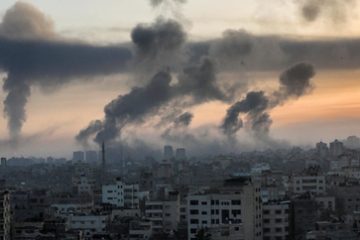
ISRAEL AND IRAN: WHAT NEXT?
With this month’s direct military strikes against each other, a war between Israel and Iran becomes not only conceivable but a growing risk. For all Israel’s advantages and determination, with the most sophisticated military in the region and an innovative and resilient economy, it is a small country of less than ten million people. Iran is a large country of over 80 million people whose economy and military capabilities have survived years of crippling sanctions. The outcome would depend on who had the strongest external support. For the time being, Israel has firm international friends and allies, as Iranian diplomats recognise. But that international support is under strain from the Israeli government’s refusal to consider any negotiations with the Palestinians …

Israel’s Strategic Dilemma
Debate in Israel about the government’s strategy in the Gaza war is heating up. While a majority of Israelis still support the war in Gaza, a growing minority are questioning whether continuing the war against Hamas will bring greater security to Israel or stability to the region, arguing that the government’s military campaign will perpetuate a conflict damaging all parties – not least Israelis themselves. Benjamin Netanyahu’s failure to bring home the Israeli hostages has reinforced tensions and doubt among the public. But continuing the war suits the incumbent government, enabling them to remain in power. Paradoxically, it also suits Hamas. Only when a majority of Israelis themselves conclude that the current strategy puts at risk rather than guarantees their …

After Gaza: Prospects for a political solution to the conflict
Despite the appalling course of events since 7 October, the continuing fighting and the suffering of the bereaved and displaced in Israel and Gaza, people are beginning to ask where this will all end, how it will end, and even whether it will end? It is essential to address these questions now, because a lasting solution can only be found once people on both sides have some hope for the future The emergence of the two-state solution Since the 1917 Balfour Declaration declared support for a Jewish homeland in Palestine and fuelled the two growing national movements of Jews and the Palestinian Arabs, there have been only three possible solutions to the question of who lives in the land between …










